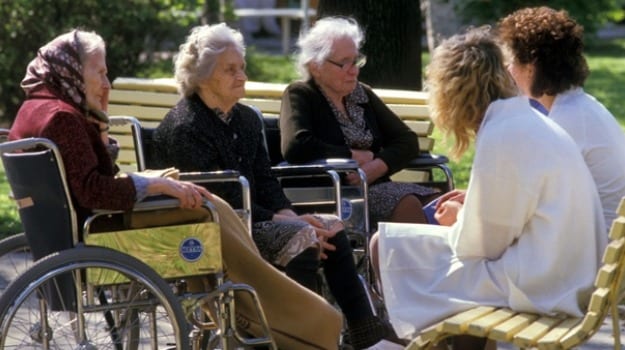Campaigners point finger at austerity as Public Health England report shows first decline across all age groups in nearly two decades
Cuts to social care may have contributed to a shock fall in life expectancy for older women, campaigners have said.
Life expectancies for women aged 65, 75, 85 and 95 all fell in 2012 compared with a year earlier, the first slip in all age groups in nearly two decades.
There was also a small drop in life expectancy for men at ages 85 and 95, while longevity for men in the two younger age groups stagnated, according to a report published on Tuesday by Public Health England (PHE).
Although the figures for 2013 did not show any further falls, the life expectancies for men and women aged 85 and 95 failed to recover to 2011 levels, which were the highest to date.
Age campaigners warned the unexpected decrease in life expectancies was a “canary in the coal mine”, showing how five years of austerity was beginning to take its toll on elderly people.
But PHE said it was too early to conclude there was a significant change in the three-decade-old upward trend in life expectancy. Its report suggested the falls could be due to flu or bad weather, or even a statistical blip, although it noted that they were reflected elsewhere in Europe.
The life expectancy of an average 75-year-old woman in 2013 was 13 years and five weeks, five weeks fewer than people of that age in 2011, according to PHE’s data. Women of 85 could expect to live a further six years and 42 weeks, two and a half months fewer than their counterparts of that age two years ago.
The falls come after five years of cuts to social care services, prompting some campaigners to warn that the government’s austerity programme could be leaving older people without enough support.
Caroline Abrahams, charity director for Age UK, said: “This decrease in life expectancy, after many years of improvement, is like the canary in the coal mine: it is telling us that something has changed for the worse, so that fewer people are thriving in later life than they could or should.
“The most obvious likely culprit is the rapid decline of state-funded social care in recent years, which is leaving hundreds of thousands of older people to struggle on alone at home without any help.”
The falls in life expectancy come after three decades in which life expectancy has on average increased by 1.2% for men aged 65 and 0.7% for women. It is the first time since 1995 that life expectancy has fallen among women of all four age groups studied, and the fifth time overall. Each time life expectancies have recovered and continued to improve.
“Fluctuations in life expectancy at older ages have occurred in the last 30 years and despite this the trend analysis shows that the overall trend has been upwards,” PHE’s report said.
Prof John Newton, chief knowledge officer at PHE, said: “There has been significant interest already in these data. However, the analysis presented in this report suggests it is too early to conclude that there has been a significant change in the overall upward trend in life expectancy at older ages.”
But Prof John Ashton, president of the Faculty of Public Health, warned against government statisticians dragging their feet over drawing conclusions from the data.
He said: “This line that Public Health England are taking is slightly concerning because we have now had this data, this is the second year, and I’m wondering how many years of data do they need?
“This data is concerning because what we have had historically is a golden generation born after the first world war that have done very well with their health. Beginning in the 1970s we have had increasing numbers of people belonging to that cohort who were living increasingly long.
“But we have this massive increase in unemployment in the 1980s, which created a large number of long-term unemployed and we really need to know what’s happening to these people.”
Ashton said many of those long-term unemployed had in the past few years been faced with back-to-work assessments, with many reintroduced to the workforce in cases where this may have been inappropriate.
Echoing the comments made by Age UK, Ashton continued: “We know there have been these big cuts to social services and social support over the past few years and we need to know if this is having an effect.”
Now, with the strong possibility of a hung parliament and government paralysis after the looming election, Ashton said he was concerned the issue of falling life expectancy could be ignored.
“If this is a real phenomenon, we are not going to have any action on it for over a year,” he said. “We need to have a conversation about what we are going to do about this.”
Campaigners point finger at austerity as Public Health England report shows first decline across all age groups in nearly two decades









